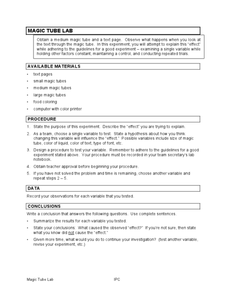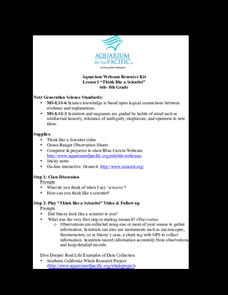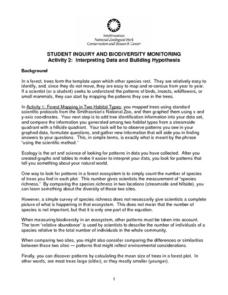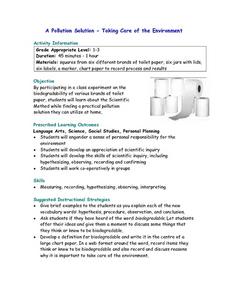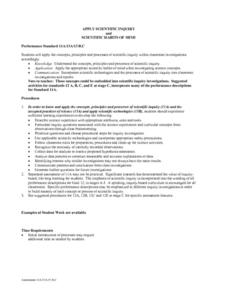Curated OER
Magic Tube Lab
In this scientific investigation instructional activity, students use "magic tubes" to make observations, hypothesize, study variables in experiments, write procedures, and draw conclusions.
Curated OER
The Scientific Method
In this scientific method worksheet, students complete a crossword puzzle given 21 clues about the steps of the scientific method. Topics include observations, hypotheses, variables, inferences, results and conclusions.
Howard Hughes Medical Institute
Lesson 3: Scientific Inquiry with WildCam Gorongosa
When biologists installed cameras in Gorongosa National Park, they ended up viewing a lot more than the lions they were trying to help! Young ecologists observe one of Africa's most beautiful savanna regions with interactive trail camera...
Aquarium of the Pacific
Think Like a Scientist
Scholars watch a video and meet a scientist who is studying sharks as she explains her observations about the sharks and provides her hypothesis to explain their behavior. Learners then act like a scientist as they watch an aquarium...
Crafty Classroom
Guided Scientific Method
Guide learners through an experiment with a set of worksheets on the scientific method. Six steps prompt your class to ask questions, conduct research, form a hypothesis, test theories, analyze data, and report results.
Curated OER
Develop a Hypothesis
Students develop a hypothesis regarding the quality of a nearby body of water. They analyze locally collected data and compare it with data from different areas. They evaluate their original hypothesis as part of a larger unit.
Curated OER
Predicting: Making a Hypothesis
Students analyze information from various sources to create a hypothesis about the origin of a family artifact. Students create a hypothesis about the origin of the item and write a paragraph explaining why they believe the hypothesis is...
Curated OER
Observing Osmosis in a Chicken Egg
Tenth graders develop a hypothesis and explain what they observed on an activity. For this investigative lesson students observe osmosis and report their data using a graph.
Curated OER
Making Careful Observations
Second graders view pictures of items they recognize, items they don't recognize, and write observations they see. In this observations lesson plan, 2nd graders discuss how they use their observations.
Curated OER
Mystery Boxes
In this observations worksheet, students are given a box with unknown items inside. They are to experiment with the box and determine what is inside by shaking, rattling and rolling the box. They write down an educated guess for six items.
Curated OER
Identifying Birds
Eighth graders identify and name birds in their school yard by comparing and contrasting pictures of 12 common birds in the Phoenix metro area using the Ecology Explorers Protocol. They formulate questions based on observations that lead...
Curated OER
Note Taking And Skills And Lab Reports
Students perform simple and fun experiments to use the scientific method, take careful notes, and write a lab report. They first make and test a hypothesis about how many drops of water they can fit on the face of a penny and then test...
Curated OER
An Introduction to Microbes and Microbes Are Everywhere
Seventh graders define the term microbe. They identify the five main groups of microbes. Students give examples of ways in which microbes have impacted or currently impact human life. They create a hypotheses for where they expect to...
Curated OER
Planetary Surface Evolution and Resurfacing
Students are provided with drawings of planet surfaces in order to investigate different types of planetary terrain. They make observations for each planet and discuss the characteristics observed. The lesson includes background...
Cornell University
Sun or Water? or Both?
Over the course of 10 days, young scientists observe their cups of seed and soil—one that gets sun and water and one that gets no sun and only water. Then they reflect on the results of the experiment to determine if their hypothesis was...
Curated OER
Mentos Geyser! What's the Fizz Factor?
What is it that makes Mentos candy and cola such an explosive combination? Find out through scientific inquiry and experimentation. This presentation walks learners through the scientific process and allows them to speculate whether it...
Concord Consortium
Energy of a Spring
Spring has sprung! Young physicists explore the properties of springs with a simple simulator. Users control the initial position of the spring, then observe the potential, kinetic, and thermal energies in the system.
Curated OER
Interpreting Data and Building Hypothesis
Students define the term species, and graph species data together with previously collected data at the National Zoo. They interpret graphed data and recognize patterns in the streamside quadrant versus hillside quadrant. Students use...
Curated OER
A Pollution Solution- Taking Care of the Environment
Pupils examine the biodegradability of different brands of toilet paper in a hands-on activity. Through this activity they also discover the steps of the Scientific Method and use new terms such as hypothesis, procedure, observation, and...
Curated OER
Look At Those Leaves!
Students observe leaves and their attributes and group them accordingly. In this science observation activity students gather leaves and use them to become more familiar with seasonal changes and the cycles of our environment.
Curated OER
8th Grade Earth Science: Density
Learners draw upon their prior knowledge of the density of water and practice writing a hypothesis, making an observation, and analyzing data while watching a density demonstration.
Curated OER
Apply Scienctific Inquiry and Scientific Habits Of Mind
Students describe science experience with appropriate attributes, units, and tools. They formulate inquiry question associated with the science experiences and curricular concepts from observations through class brainstorming. Pupils...
Curated OER
Cody's Science Education Zone
Students observe a scientific experiment and pose a hypothesis. In this scientific inquiry lesson, students make predictions about the combination of alcohol in water and how it will affect a floating ice cube.
Curated OER
Problem-Solving Methods in Biology
In this problem-solving learning exercise, students will read a biologist's observations about elephant communication. Students will write down what the biologist observed, what facts she knew about elephants, and her hypothesis....


